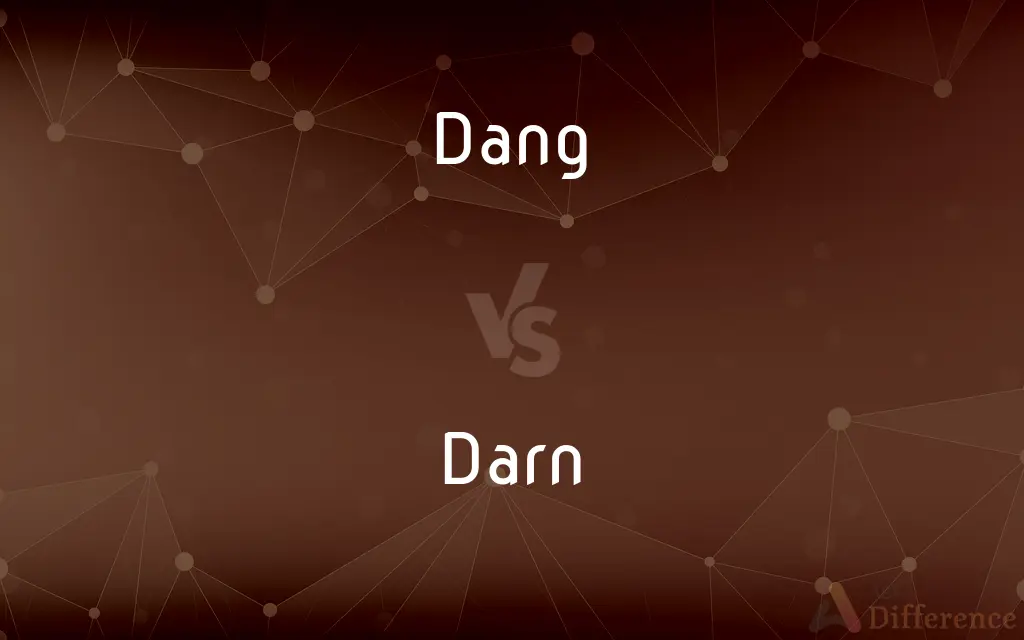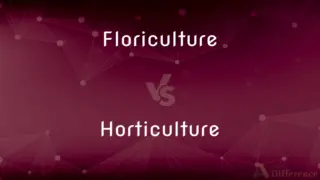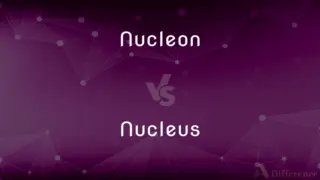Dang vs. Darn — What's the Difference?
Edited by Tayyaba Rehman — By Maham Liaqat — Updated on May 8, 2024
Dang and darn are both mild expletives substituting for stronger swear words; dang is a euphemism for "damn," while darn replaces "damned."

Difference Between Dang and Darn
Table of Contents
ADVERTISEMENT
Key Differences
Dang is commonly used in informal American English as a mild expression of frustration or disappointment, serving as a softer alternative to "damn." Whereas darn also functions similarly but substitutes for "damned" and can sometimes imply a stronger level of annoyance.
Dang often appears in contexts where the speaker wishes to avoid cursing but still expresses a strong emotion. On the other hand, darn is frequently used in similar situations but can carry a slightly quaint or old-fashioned tone.
Dang might be seen as slightly more forceful or emphatic in expressing disbelief or irritation. While darn tends to be more versatile, appearing in phrases like "darn it" or "darned if I do," which show a range of emotions from mild irritation to resigned acceptance.
Dang can be used across all age groups and is particularly popular in southern United States dialects. Whereas darn is universally understood in English-speaking countries and often appears in children's literature and family-friendly content.
Dang lacks some of the domestic connotations of darn, which can also mean to mend, especially in the context of sewing. While darn retains this dual meaning, adding a layer of domesticity to its usage.
ADVERTISEMENT
Comparison Chart
Meaning
Euphemism for "damn"
Euphemism for "damned"
Connotation
Slight forcefulness, frustration
Slightly quaint, versatile
Common Usage
Emphasis, disbelief
Mild irritation, acceptance
Popularity
Especially in southern US
Widely used in English-speaking
Additional Meaning
None
Also means to mend or repair
Compare with Definitions
Dang
A mild curse substituting for "damn".
Dang! I missed the bus.
Darn
Expressing disbelief or frustration.
Darn, I can’t believe we lost the game.
Dang
Interjection used to express disappointment.
Dang, I forgot to bring my keys!
Darn
Used in expressions of resignation.
Darn if I do, darn if I don't.
Dang
Used for emphasis.
That was a dang good meal!
Darn
Interjection expressing mild annoyance.
Darn, I lost my wallet.
Dang
Expressing frustration.
Dang, this puzzle is hard to solve.
Darn
A softer term for "damned".
That darn dog escaped again.
Dang
Used to express surprise.
Dang! That’s a lot of money for such a small item.
Darn
As a verb, to mend holes, especially in fabrics.
I need to darn these socks.
Dang
Used to express dissatisfaction or annoyance.
Darn
To mend (a garment, for example) by weaving thread or yarn across a gap or hole.
Dang
Damn.
Darn
To repair a hole, as in a garment, by weaving thread or yarn across it.
Dang
To damn.
Darn
To damn.
Dang
The least valuable bit; a jot
I don't give a dang.
Darn
A hole repaired by weaving thread or yarn across it
A sock full of darns.
Dang
(euphemistic) Damn.
Darn
Used to express dissatisfaction or annoyance.
Dang
(obsolete) ding
Darn
Damn.
Dang
To dash.
Darn
(euphemistic) Damn.
Dang
(euphemistic) Damn.
Darn
Damned.
Dang
(euphemistic) Damn.
Darn
(euphemistic) Damn.
Dang
(euphemistic) A damn, a negligible quantity, minimal consideration.
I don't give a dang.
Darn
(transitive) Euphemism of damn.
Dang
A dam structure placed around a body of water, used because of the homophony between damn.}}
Darn
To repair by stitching with thread or yarn, particularly by using a needle to construct a weave across a damaged area of fabric.
I need to darn these socks again.
Dang
To dash.
Till she, o'ercome with anguish, shame, and rage,Danged down to hell her loathsome carriage.
Darn
A place mended by darning.
Darn
To mend as a rent or hole, with interlacing stitches of yarn or thread by means of a needle; to sew together with yarn or thread.
He spent every day ten hours in his closet, in darning his stockings.
Darn
A colloquial euphemism for Damn.
Darn
A place mended by darning.
Darn
A euphemism for `damn'
Darn
Something of little value;
His promise is not worth a damn
Not worth one red cent
Not worth shucks
Darn
Sewing or darning that repairs a worn or torn hole (especially in a garment);
Her stockings had several mends
Darn
Repair by sewing;
Darn socks
Common Curiosities
Which term is older, "dang" or "darn"?
"Darn" is older, with documented usage dating back to the 18th century.
Is there a regional preference for using "dang" or "darn"?
"Dang" is especially popular in the Southern United States, while "darn" is widely used in all English-speaking regions.
Is "dang" a modern term?
"Dang" has been used for many decades, though it is considered to have a more modern edge compared to "darn."
Can "darn" be used as a verb?
Yes, "darn" also means to repair, especially by sewing.
Are "dang" and "darn" acceptable in formal writing?
They are generally considered too informal for formal writing.
Can "darn" be used in a positive context?
Yes, "darn" can be used positively, as in "That’s a darn good job!"
Can "dang" and "darn" be used in professional settings?
They are casual and generally not preferred in professional contexts, but may appear in light-hearted or informal communication.
Can "dang" and "darn" be used interchangeably?
Yes, both can substitute for stronger swear words, though they may carry slightly different emotional weights.
Do "dang" and "darn" appear in literature?
Yes, both terms appear in literature, particularly in dialogue to convey character speech patterns and to maintain a mild tone.
What type of emotions do "dang" and "darn" typically express?
Both express minor irritation, frustration, or surprise, but can also be used for emphasis in positive statements.
How are "dang" and "darn" used in movies and television?
They are often used in family-friendly movies and TV shows where harsher language is inappropriate.
Are "dang" and "darn" appropriate for children to use?
Yes, both are considered mild expletives and are generally acceptable for children.
Do "dang" and "darn" have the same level of acceptance in all English-speaking countries?
"Darn" is more universally recognized and accepted across English-speaking countries, while "dang" is more prevalent and familiar in the United States.
Are there any famous quotes that include "dang" or "darn"?
Yes, both terms have been used in famous movie lines and popular expressions, often to add a humorous or light-hearted touch.
Are there variations of "dang" and "darn" that convey different intensities?
Yes, variations like "dang it" or "darn it" can emphasize stronger feelings of frustration or disappointment.
Share Your Discovery

Previous Comparison
Floriculture vs. Horticulture
Next Comparison
Nucleon vs. NucleusAuthor Spotlight
Written by
Maham LiaqatEdited by
Tayyaba RehmanTayyaba Rehman is a distinguished writer, currently serving as a primary contributor to askdifference.com. As a researcher in semantics and etymology, Tayyaba's passion for the complexity of languages and their distinctions has found a perfect home on the platform. Tayyaba delves into the intricacies of language, distinguishing between commonly confused words and phrases, thereby providing clarity for readers worldwide.
















































